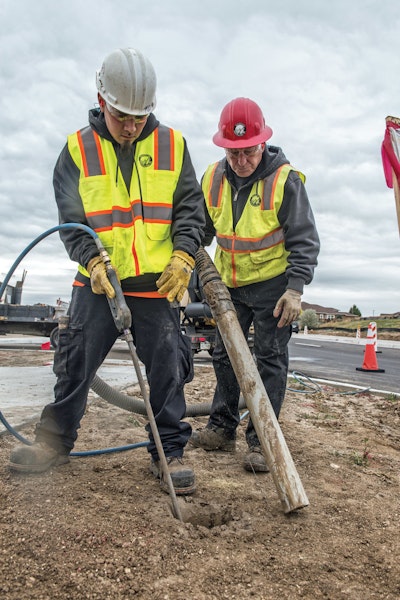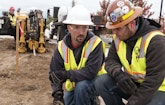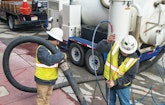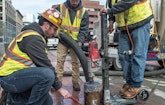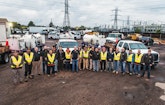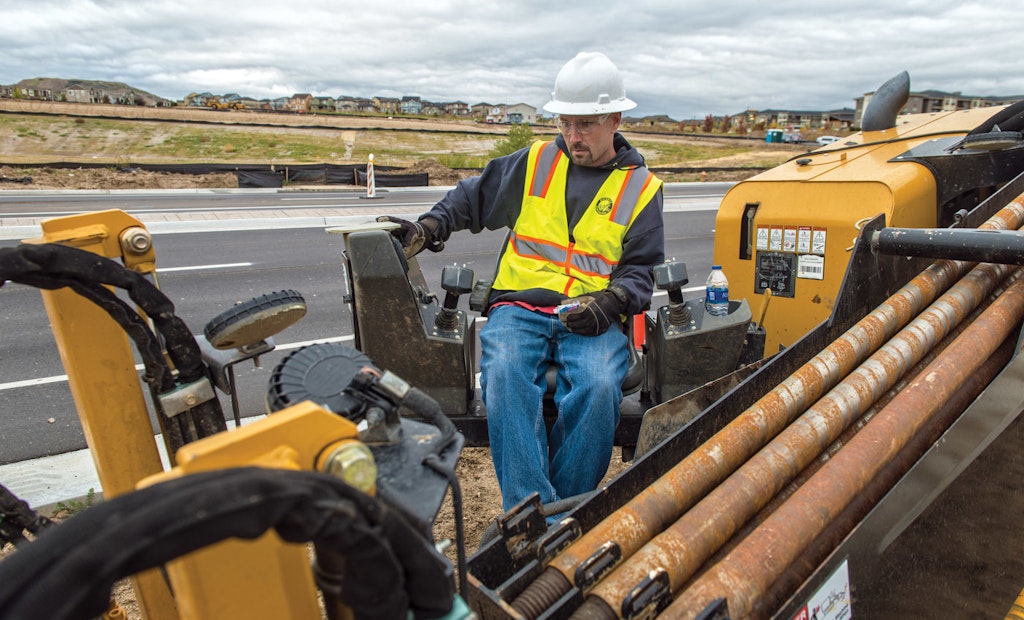
Branden Witt, head locator with Diversified Underground, lines up a Vermeer D20X22 horizontal directional drilling unit in preparation to install underground electrical utilities for new traffic lights.
Interested in Business?
Get Business articles, news and videos right in your inbox! Sign up now.
Business + Get AlertsIf ever a company was aptly named, it’s Diversified Underground, based in Aurora, Colorado. Since its inception in 2000, the company has steadily expanded its core services by following a simple formula: Determine what services customers need, and invest in advanced, reliable equipment that can efficiently deliver those services.
The results speak for themselves. When owner Richard Chuapoco and his wife, Helena, started the company as a horizontal directional drilling outfit, he started out with one employee — himself — and one drilling machine, a Vermeer 7x11. Today, the company employs 43 people and owns two larger directional drills, one tandem-axle vacuum truck, eight small trailer-mounted hydroexcavation/vacuum units, and a wide array of pipeline inspection camera systems, says Mark Allen, the company’s general manager.
Moreover, the company has increased its revenue every year since 2001, including an average of 22 percent revenue growth since 2013. And the company recently purchased 40 acres of property, located east of Denver in Watkins, where it plans to build an office and equipment storage facility. Before that, management ran the company from construction trailers.
How Diversified Underground got from where it started to where it is today illustrates the value of not only listening to customers, but also keeping an eye on the overall marketplace — being alert to other business opportunities. That’s no small task in an industry that demands speed and an intense focus on a daily basis. In short, when drinking water from a fire hose, it’s hard to come up for air and look at the big picture. But it’s worth the effort, Allen says.
“Our largest advantage is that our clients know they can call us and we’re a one-stop shop,” Allen explains, pointing to the company’s horizontal drilling, hydroexcavating and utility-locating capabilities. “For example, if an engineering firm needs a gas line installed for an apartment complex, we can locate and identify all the utilities and mark them. Then after the firm does the surveying, we can pothole and find the depths of all the lines we located. After that, we can do the drilling, if needed. We don’t do just one piece of the pie — we can do it all.”
Another key to the company’s growth: Hiring more estimators, which also requires management to delegate things they used to handle. In 2012, for instance, the company hired two more estimators, bringing the total to three. That contributed greatly to the company’s recent growth spurt.
“Yes, it’s hard to give up some of those responsibilities,” Allen concedes. “But it’s the natural way for a business to grow. If you try to do everything yourself, you can only do so much before you get spread too thin.”
Starting small
Allen and Chuapoco met while they were both working for a utility locating outfit in Denver during the mid-1990s. Then Allen moved to Australia to work on a large cable-laying project, during which time Chuapoco quit his job and struck out on his own, focusing on directional drilling. When Allen returned from Australia in 2002, the two joined forces and agreed to explore expanding into utility line locating.
“We already had a lot of contacts in the industry — knew general contractors and people who needed private utilities located,” Allen says. “We grew the business through a lot of beating the bushes, making phone calls and word-of-mouth referrals.”
The company’s first big break occurred when it landed a contract to locate utilities at Denver International Airport — a service it still provides today. Literally a small city, the airport is constantly expanding and upgrading its facilities, which creates strong demand for locating services.
Around that time, it occurred to Chuapoco and Allen that the company could grow by seeking dedicated hydroexcavating contracts from construction companies. “We already were doing potholing for our own projects,” he explains. “But we started thinking that if things were kind of slow in between drilling jobs, it just made sense to go out and make something happen and grow it.”
Continued expansion
That led to even further expansion from construction potholing to engineering and design work. So instead of just getting hired to locate and expose utility lines, Diversified Underground got into the design and engineering work that precedes those services. Essentially, that meant collecting all the maps and data from existing tier-one and tier-two utility owners in the area where a project is occurring, marking all those utilities, exposing them and recording all the horizontal and vertical data.
“Before we were just potholing wherever they told us to,” Allen says, explaining the difference. “But after that, we started doing everything on the front end, too.”
That service shift occurred around 2005 and 2006. “It opened up opportunities to work for more than just (general) contractors around town,” Allen points out. “It’s also more profitable than chasing small contracts for private (utility) locates.” Another advantage: The company didn’t need to make considerably more investments in equipment. “We could basically use the same equipment but just sell those services to a broader target audience.”
Today, the company owns two directional drilling machines, a Vermeer 20x22 and Vermeer 16x20, and eight trailer-mounted SpoilVac hydroexcavators, manufactured by VACMASTERS. Each SpoilVac features an 800-gallon, carbon-steel debris tank that tilts up to 45 degrees for gravity-fed drainage; it has a powerful positive displacement blower (780 cfm), 36 hp Kubota diesel engine, high-pressure waterjetting system (2,250 psi at 3 gpm), and 800-gallon water tank.
Diversified Underground also owns a tandem-axle Vactor combination truck built on a 2015 Western Star chassis. Features include a 13-cubic-yard debris tank, 1,600-gallon water tank, Cat pump (20 gpm/2,500 psi), 27-foot extendable boom, and Robuschi USA 125 blower. The company relies on locating equipment made by Vivax-Metrotech and Radiodetection as well as RIDGID SeeSnake self-leveling pipeline inspection camera systems.
Ultimately, the company’s three business sectors — each of which generate about a third of the company’s revenue — feed off the other. For example, locating work leads to hydroexcavating (potholing) work. Better yet, Allen says his employees’ locating work tends to be more accurate when they know their colleagues are following behind to do the potholing. “We do potholing based on marks done by other companies, and they’re not as accurate,” he explains. “That’s because they don’t have a horse in the race.”
Accuracy is a big deal because if a utility mark is off by just, say, 6 inches, it can result in wasted time doing unnecessary potholing while technicians probe for an underground line that’s not quite where the marks indicated it’s located. “It’s not like they’re being lax or malicious,” Allen says. “They’re just handling large workloads. And even though their marks are accurate, according to standards dictated by law, being just a few inches off becomes extremely time-consuming.”
Still drilling
Even though the company has grown significantly since Chuapoco started out and expanded its services, it still does a considerable amount of directional drilling. Most of the work centers on smaller projects, such as drilling bores for running cables to street and parking-lot lights, or for irrigation systems at golf courses and for telephone lines, Allen says.
“If the pipe is 12 inches in diameter or smaller, we’ll put it in the ground,” he says. “Locating and hydroexcavating go hand in hand, but drilling plays in the ballpark with them only every so often. It’s more of a separate entity. We don’t bid on big projects because we just can’t compete with companies that own 10 or 12 drills. They can do thousands of feet a day, while we can only do hundreds. But we’ve developed a good niche market.”
The company doesn’t shy away from more challenging jobs, either. That includes some big projects, such as the installation of four 300-foot-long 4-inch-diameter conduits for electrical lines under a runway at Buckley Air Force Base in Aurora. Or drilling bores for more than 3,000 feet of new waterlines at the Denver Zoo. “We were there on and off for almost three months,” Allen says. “We had to bore line through the zoo to the hippo and giraffe enclosures. It was interesting and challenging — a lot of after-hours work.”
Looking ahead, Allen sees more growth potential because Denver is one of the fastest-growing cities in the country in terms of commercial and residential development. “The housing market is booming and Denver is just blowing up, so things look good for our industry,” he says. “In the long run, I’d like to add two to four more hydrovacs and four to six more locators. I think there’s enough of a market to support that.”
Moreover, after the company moves into its new facilities, it’ll have enough space to hire more office staff and sales managers, which will provide the resources to go after more contracts. As for adding more services, Allen says the company has the tools and equipment — pipeline inspection cameras and combination trucks — as well as the know-how to get into pipeline inspections and jetting drainlines.
“It’s certainly not out of the question that we could utilize the equipment we have on a subcontracting basis.”
Multipurpose machines for a multiservice company
It seems only fitting that Diversified Underground has invested in eight SpoilVac hydroexcavators made by VACMASTERS. Why? The machines are a perfect complement to the company’s multifaceted service offerings, capable of everything from exposing utility lines and slot trenching to cleaning culverts and catch basins and performing caisson excavations.
In addition, the trailer-mounted SpoilVacs are more maneuverable than larger hydroexcavating trucks, which has opened a new niche market for the Aurora, Colorado-based outfit: excavating and vacuuming in difficult-to-access locations, says Mark Allen, the company’s general manager.
“The medium size of these units allow us to offer customers a good competitive price and grab a piece of the market that bigger trucks can’t enter,” Allen says. “A lot of our competitors run big vacuum trucks and charge a lot more to be on a job site … but we can outbid those bigger trucks. So in many cases, we can locate utilities faster and more economically with the SpoilVacs.”
Allen also lauds the units’ reliability. One of the units is more than 10 years old but “still runs like a champ,” Allen says. On-the-job breakdowns are a profit killer, he says, noting that the company is paying employees’ wages even though they’re not able to work. In addition, Diversified Underground is usually the second contractor on a job site after pipeline locators. Tasked with finding the depth at which pipelines are located, the company must finish its work before the next contractor — usually excavation companies — can get in.
As such, no one wants to be the contractor that has to stop working, creating a negative domino effect that puts projects behind schedule. “Getting in and out quickly is important,” Allen says. “We always seem to be under the gun.”
The SpoilVacs — which weigh about 6,000 pounds — are towed by four-wheel-drive Ford F-450s or International 5500s. That allows Diversified Underground to also carry “squeegee” (gravel backfill material) to job sites. That provides another cost advantage because competitors with large vacuum trucks have to bring a second truck to a job site to accomplish the same task, Allen says.
That’s not to say Allen doesn’t ever think about investing in a larger hydroexcavating machine. “But every time we look at the price tag of a big truck, we say, ‘No, let’s just get another SpoilVac,’” he says. “They’re very reliable workhorses. We know we can take them to a job site and get work done in a timely manner with minimal breakdowns. You just can’t ask for much more than that.”
